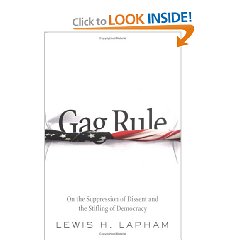Two comparisons are drawn by the author between the Bush Administration's abuse of the law and their control, and the past: the American past, when the Sedition Act was used to jail dissenters and subvert new immigrant voters; and the German past, when Hitler and Goering pulled off a gradual castration of free voice and vote with incremental steps, all done gradually, incrementally, inconspicuously, until suddenly a state of totalitarian rule existed. As the White House officially considered postponing the Presidential election of 2004, perhaps canceling it all together, one's bones can only feel the chill of these two examples, both discussed calmly and carefully by the author.
There is a solid strain of economic thinking woven throughout the book, and one can only conclude that the concentration of wealth and the crimes against the working poor now being perpetuated, can only lead to a Great Depression as the labor economy collapses and the technology economy is attacked by the combined ills of overdue break-down, deliberate sabotage, and a withdrawal of foreign credit. The author makes the point on page 85 that America has elevated capital above humans–capital votes in America, humans do not, in the one place where it really matters: the crafting of legislation that transfers wealth from the individual working poor to the privilege elite that own the military-industrial-prison complex.
Gifted ideas and turns of phrase abound. The author is consistent with others I have read in lamenting the continuing decline of our educational system, designed to create conformist factory workers, and goes beyond the norm in suggesting that perhaps 70% of our national potential intellectual capacity is being “killed” by the mediocrity of our existing educational institutions. I agree with that. Our children survive school, much as we survive hospitals and corporations–our institutions are no longer about humanity and emergence, but rather about docility and conformity.
The author is eloquent on the rise of politics as ignorance aggravated by a sublime arrogance that confuses a commitment to a narrow elite with “God's will,” and regards laws as means of “crowd control.”
Sadly, the majority of America does not read books. If they did, this book would be motivating people to take to the streets and demand that the core issue in the election of 2004 be that of restoring the integrity of politics, from counting every vote to refusing every bribe. Absent an awakening of the upper middle class that does read and think for itself, the author has written the epitaph of democracy in America.





